
Common name:White Sage, Sacred White Sage
Botanical name:Salvia apiana
This woody shrub has long stems with silvery white leaves and fragrant white flowers that bloom in the spring. It provides a strong structural form as a garden focal point. It can reach 6' tall and 6' wide.
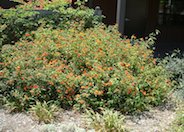
Common name:Radiation Orange Lantana
Botanical name:Lantana 'Radiation'
This shrub will grow 3'-6' tall and has small, dark green leaves with orange and red flowers that are in constant bloom all year.
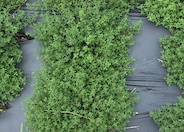
Common name:Common Thyme
Botanical name:Thymus vulgaris
This perennial will grow 1' tall and 2' wide. It has gray green leaves with white or lilac flowers that bloom in spring and summer. Leaves can be used for seasoning.
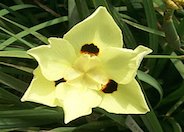
Common name:Yellow Moraea, Fortnight Lily
Botanical name:Dietes bicolor
This clumping perennial Iris relative stands 3'-4' high. It has light yellow, iris-like flowers with maroon blotches that are about 2" wide. It performs best in full sun and in soil with good drainage.

Common name:Jerusalem Sage
Botanical name:Phlomis fruticosa
This hardy perennial is a useful, old-time garden plant with coarse, woolly gray green, wrinkled leaves and yellow, 1" flowers in ball-shaped whorls. It handles drought and poor soils but needs full sun.
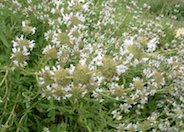
Common name:Black or Honey Sage
Botanical name:Salvia mellifera
This woody shrub has fragrant, dark green leaves with blue, white, or lilac flowers that bloom in the spring and summer.
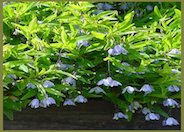
Common name:Australian Bluebell Creeper
Botanical name:Sollya heterophylla
The Australian Bluebell Creeper is a spreading evergreen shrub that grows 2'-3' tall, or a climbing vine that grows to 8' tall with support. It has attractive, glossy green foliage and blue, bell-shaped summer flowers. This shrub can tolerate full sun on the coast and part shade inland. It can grow under Eucalyptus trees, and needs good drainage. The Australian Bluebell Creeper is also drought tolerant. -Cornflower Farms
Designer: Owner Designed
Photographer: GardenSoft
Practice grass-cycling by leaving short grass clippings on lawns after mowing, so that nutrients and organic matter are returned to the soil.
Be sure to fix all leaks promptly no matter how small they may seem.
Attract, or buy beneficial insects such as ladybugs and lacewings to control pest outbreaks in your garden.